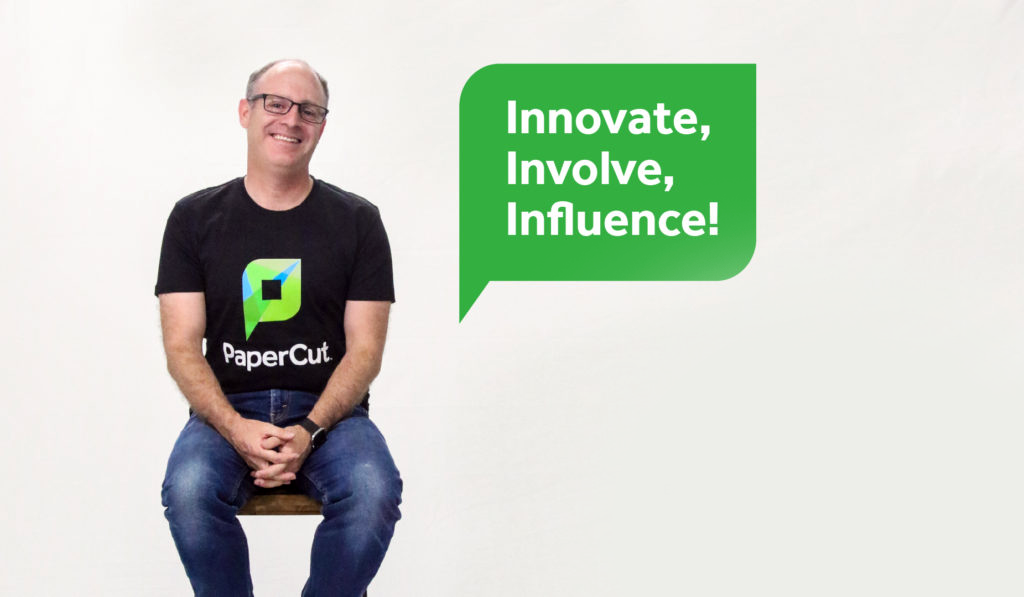This story first appeared in issue 83 of Print IT Reseller
Fresh from the launch of PaperCut Hive, Print IT Reseller Editor Michelle Ryder caught up with Chris Dance, CEO and Co-founder of PaperCut, to discuss print consolidation, cloud print and hybrid working.
[podcast url=https://storage.googleapis.com/cdn1.papercut.com/web/blog/podcasts/210622-BLOG-a-print-path-for-the-future.mp3]
MICHELLE RYDER: Can we expect to see more print market consolidation in 2021?
CHRIS DANCE: We’ve seen a decline in printing during the lockdowns and that does lead to consolidation in markets and I think there will be further consolidation. We may see fewer manufacturers making printers and more industry partnerships formed.
Who is consolidation better for? The customer, or the industry?
What has always been awesome about print, is that it truly operates as an ecosystem. Due to this, there has always been lots of choice, both from vendors and suppliers, but also in the array of device types for different use cases. I think it’s really important and it continues because it does drive competition, innovation and, most important of all, better choice for customers.
I think from our vendor neutral perspective, as long as there is choice and interoperability, it doesn’t matter what operating system, what printer make or model, or how you wish to host your software; whatever your choice is, we can continue to support it.
If the whole print ecosystem plays a role in helping drive down print costs, while encouraging responsible print, what else can it do?
Our philosophy is that we want to minimise waste. So that’s the core metric we measure and that we strive for.
We’re trying to carve off waste on those uncollected print jobs, those unnecessary non duplex print jobs, or that time when someone accidentally prints 10,000 pages. Our job is to eliminate those scenarios and to do this, I think the industry should be encouraging digital transformation as it can put an end to the unnecessary printing that’s still going on.
I think the ecosystem works really well together. I’m often amazed by the support that we get from dealers, resellers and service providers. I’m in awe of the support we get from our OEM partners too, with the influence they let us have over their roadmaps or in fixing difficult bugs. I really admire this amazing tradition of print just working together to solve customer problems. That’s what the ecosystem does best.
What’s holding companies back from moving print management to the cloud?
I think most cloud transitions are a journey, rather than a step change. And, even then, different businesses move to the cloud at a different pace. There are a lot of reasons for that.
Sometimes it’s just change management. Other times, the delays may hinge on concerns about security. In the printing space, there may be concerns about functionality as well.
The benefit for the customer is cloud printing makes printing easy, while minimising waste. The cloud opens up that world, where pretty much any customer of any size in any situation can benefit from it.
So, that’s why I think the cloud is so relevant for someone selling print services; you want to offer a great service for customers, and the cloud helps make that easier and more rewarding.
How does print need to change to accommodate to hybrid working?
The pandemic means that the world is changing, and there’s a lot more flexibility needed in the working environment. So we’ve accelerated features that help facilitate hybrid or diverse working environments.
Hybrid working has definitely influenced our approach, like the decision to carve off our Mobility Print solution as a standalone offering and release it for free. One of the additional drivers for that decision was the end of life for Google Cloud Print. The world still needed a solution that enabled users to print across network domains and that means being able to print from home.
What’s the future for PaperCut MF now that PaperCut Hive is on the scene?
There’s a long future for it. PaperCut Hive is not a replacement for it. What we’ve done is to enter the market initially in the SMB-type space, with an objective of making sure that it can scale to meet the needs of enterprise– sized organisations.
PaperCut Hive is a cloud-native print management solution, which brings the power, control, security and savings of print management traditionally enjoyed by large businesses to organisations of any size, even the smallest around the world, via serverless printing. One of the strengths of the Edge Mesh within PaperCut Hive is you don’t have to have infrastructure if you don’t want it, while removing single points of failure that affect other print management in the cloud solutions that use appliances to connect to the cloud.


